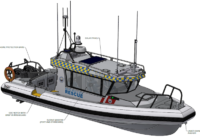Club Marine has introduced a raft of enhancements to its boat insurance product that set significant new industry benchmarks and give policy holders greater freedom, flexibility, and clarity.

It follows a comprehensive review of policy guidelines and terminology, tailored to include new boating trends and technologies while recognising that many owners now want to go further and, in some cases, faster when using their pride and joy.
The customer-centric approach extends to the rewording and restructuring of sections to improve clarity, with concise layman’s language being applied.
“In the 65 years that Club Marine has been providing insurance for Australian boaters, this is one of the most important and exciting revamps of our policy document, in keeping with our long-held status as an industry leader,” Club Marine CEO Tim Wiles says.
“The PDS is an important document, but we know it’s not always fully read by Members until the event of a claim. So, our goal was to not just provide significantly better cover but to also make it easier and more efficient to interact with our boating customers. It will hopefully provide even more confidence and reassurance.”
As an example of the changes, theft precautions are clarified so that owners can better understand their responsibilities. Boats and/or trailers can be secured to a locked motor vehicle or a fixed object using a combination of chains and locks, plus hitch locks are included among acceptable anti-theft devices.
Having risen in popularity, electric watersports equipment can be covered for fire, theft, and following total loss of the craft, without the need to specify under accessories. Coverage is also extended to bow thrusters and power generators, including wind and solar generators.
Boat tenders gain automatic coverage for tow sports, and the allowable speed limit for personal watercraft rises from 65 knots (120km/h) to 70 knots (129.6km/h).
Yacht owners also benefit as the race distance exclusion limit is extended from 25 nautical miles (46km) to 150 nautical miles (277km) and spinnaker restrictions are removed.
Meanwhile, owners who keep their vessel in nominated commercial marina berths or private pontoons/jetties will have their excess waived if the boat sustains damage while at rest, other than due to lightning strike or a named cyclone.
At the same time, liability rules applying to professional skippers/crews and transporters have been amended, making it easier for craft to be relocated.
Members who accrue five years without a claim will have their No Claim Bonus protected while the policy remains active and has been renewed without break. The ability to transfer protection points remains unchanged. Further, limits for Accidental Pollution, funeral benefits, Club Care and more have risen.
“These market-leading features and benefits will greatly streamline the process as it’s more about what we do cover than what we don’t,” Tim Wiles adds. “The new policy is up and running now and will naturally filter through our renewals process in coming months.”
The new PDS has been positively received by boating industry representatives.
“Increasing the racing distance and removing the spinnaker restrictions will get clubs thinking about new events to give sailors more opportunities to compete and improve their skills,” Southport Yacht Club General Manager Brett James said.
“Also, it’s pleasing to see the excess waiver for boats kept in marina berths as it will further encourage owners to keep their boats safely berthed in a pen rather than on a swing mooring. It helps make boat ownership more affordable and is another sign that Club Marine really is the boat insurance company run by boaties.”
JSW Powersports General Manager Tom Niederer adds, “Club Marine is to be applauded for listening to dealers and owners as the boating market continues to evolve. Like us, they’re working hard to remove hurdles and make boat ownership more accessible.
“Our customers want to know they’re covered, and I think the simplification of the policy wording will help them to better understand their policy and minimise their risks.”







